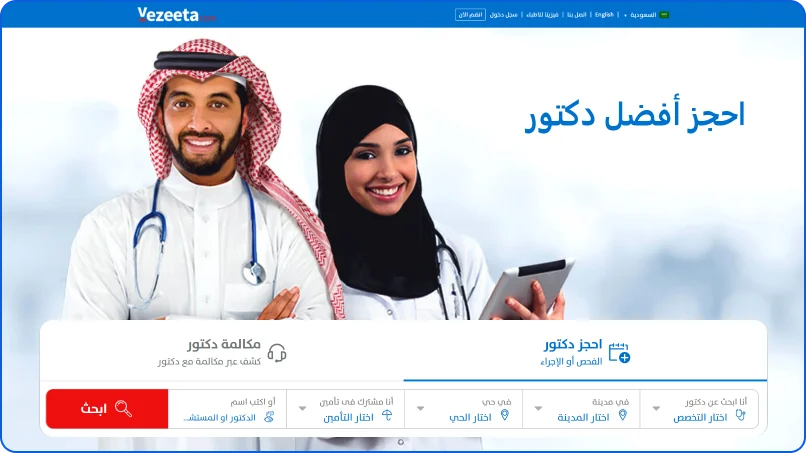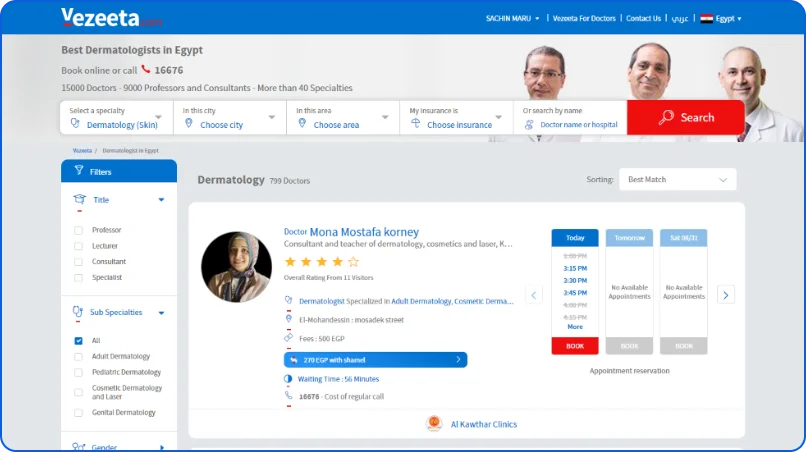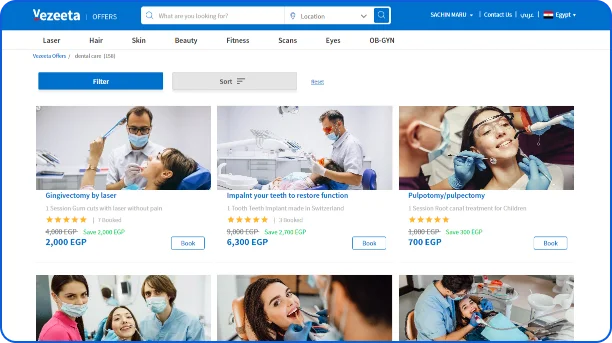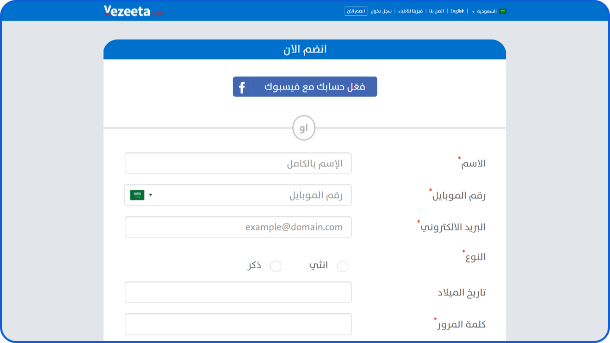The Digital Health Divide: Obstacles Facing MENA's Healthcare System
Lack of Mobile Optimization
Many areas in the MENA region faced a shortage of healthcare providers, making it difficult for patients to find and schedule appointments with suitable doctors.
Long Wait Times
Patients often experienced extended wait times for appointments, sometimes leading to delayed treatments and worsening health conditions.
Lack of Transparency
There was little publicly available information about doctors' qualifications, patient reviews, or pricing, making it challenging for patients to make informed decisions.
Inefficient Appointment Systems
Many healthcare providers relied on outdated appointment booking methods, leading to scheduling conflicts and missed appointments.
Language Barriers
The diverse linguistic landscape of the MENA region posed challenges in providing accessible healthcare information to all communities.
Uneven Distribution of Healthcare Services
Urban areas often had better access to healthcare services, leaving rural populations underserved.
Rising Healthcare Costs
Many patients struggled with the increasing cost of healthcare, often lacking information about pricing and payment options.
Limited Telemedicine Infrastructure
The region lacked a robust telemedicine framework, which became particularly problematic during health crises like the COVID-19 pandemic.
Fragmented Health Records
The absence of a centralized system for managing patient health records led to inefficiencies and potential errors in treatment.
Building a Robust Health-Tech Ecosystem Vezeeta's Technical Foundation
Scalable Cloud Infrastructure
Utilizing Microsoft Azure for high availability and scalability to handle millions of users and transactions.
Microservices Architecture
Implementing a microservices-based architecture for modular development and easier maintenance of different platform features.
Real-Time Appointment Booking Engine
Developing a sophisticated booking system that synchronizes with doctors' calendars in real-time, preventing double bookings.
Secure Payment Gateway Integration
Incorporating multiple payment gateways like PayFort Money and Authorize.Net to facilitate secure online transactions.

Multi-factor Authentication
Implementing robust security measures to protect sensitive patient data and ensure HIPAA compliance.
Geolocation Services
Integrating mapping APIs for location-based doctor and clinic searches.
Push Notification System
Developing a reliable notification system for appointment reminders and updates.
Video Conferencing Integration
Incorporating WebRTC for seamless telehealth consultations.
Multilingual Support
Implementing a flexible localization system to support multiple languages, particularly Arabic and English.
Mobile-Responsive Design
Ensuring a consistent user experience across various devices and screen sizes.
The Blueprint of Digital Healthcare Vezeeta's Architectural Framework
Three-Tier Architecture
Vezeeta's platform is built on a robust three-tier architecture consisting of the presentation layer, business logic layer, and data access layer.
Presentation Layer
Developed using ASP.NET MVC for the web application and native iOS (Swift) and Android (Kotlin) for mobile apps. This layer ensures a responsive and intuitive user interface across all devices.
Business Logic Layer
Implemented using C# with .NET Core, this layer handles all the core functionalities such as appointment scheduling, user management, and payment processing.
Data Access Layer
Utilizing Entity Framework Core for efficient data operations with MS SQL Server as the primary database.

API Gateway
Implementing an API gateway using Azure API Management to handle routing, authentication, and rate limiting for both internal and external API calls.
Caching Layer
Incorporating Redis for caching frequently accessed data, reducing database load and improving response times.
Message Queue
Using RabbitMQ for asynchronous processing of tasks such as email notifications and report generation.
Content Delivery Network (CDN)
Leveraging Azure CDN to deliver static content efficiently across the MENA region.
Containerization
Utilizing Docker containers for consistent deployment across development, testing, and production environments.
Continuous Integration/Continuous Deployment (CI/CD)
Implementing Azure DevOps for automated testing and deployment pipelines.
CMARIX's Blueprint for Healthcare Innovation Vezeeta's Core Functionalities

User Registration and Profile Management
- Patient registration with basic information and medical history
- Doctor registration with credentials, specialties, and clinic details
- Profile editing and management for both patients and doctors
Advanced Search and Filtering
- Search doctors by specialty, location, availability, and insurance acceptance
- Filter results by consultation fees, ratings, and language spoken
- Geolocation-based search for nearby clinics and pharmacies

Appointment Booking System
- Real-time calendar integration for instant slot availability
- Multiple booking options: in-person, telehealth, or home visits
- Automated appointment reminders via SMS and email
Telehealth Consultation
- Secure video conferencing integration for remoteconsultations
- File sharing for medical documents and test results
- In-app chat for follow-up questions and clarifications


Review and Rating System
- Post-appointment feedback collection from patients
- Public display of aggregated ratings and reviews for doctors
- Quality control measures to ensure authentic reviews
e-Prescription and Medication Delivery
- Digital prescription generation by doctors
- Integration with local pharmacies for medication fulfillment
- Home delivery option for prescribed medications
Multilingual Support and Localization
- User interface available in Arabic & English
- Localized content and healthcare information
- Region-specific regulatory compliance features
Electronic Health Records (EHR)
- Centralized storage of patient medical history and test results
- Secure access for authorized healthcare providers
- Integration with local hospital and laboratory systems for seamless data exchange
Analytics and Reporting
- Comprehensive dashboards for doctors to track patient volume and revenue
- Administrative analytics for platform usage and user behavior
- Customizable reports for business intelligence and decision-making
Payment and Insurance Processing
- Multiple payment gateway integrations for diverse payment options
- Insurance verification and co-pay calculation
- Subscription model for premium services and care plans
Behind the Scenes CMARIX's Backend Innovations for Vezeeta

Appointment Management System
- Sophisticated scheduling algorithm to optimize doctor availability
- Conflict resolution for overlapping appointments
- Automated waitlist management for cancelled appointments
Caching and Performance Optimization
- Distributed caching system for frequently accessed data
- Query optimization for faster database operations
- Content Delivery Network (CDN) integration for static assets
Notification Service
- Centralized notification system for email, SMS, and push notifications
- Templating engine for personalized communication
- Scheduled and triggered notifications for appointments and medication reminders
Data Processing and Analytics
- Real-time data processing for instant insights
- Machine learning algorithms for personalized healthcare recommendations
- Batch processing for large-scale data analysis and reporting
Logging and Monitoring
- Centralized logging system for error tracking and debugging
- Real-time monitoring of system health and performance
- Automated alerts for critical issues and anomalies
User Authentication and Authorization
- Secure JWT-based authentication system
- Role-based access control for patients, doctors, and administrators
- Multi-factor authentication for enhanced security
Integration Layer
- RESTful APIs for seamless integration with frontend applications
- WebSocket implementation for real-time updates
- API versioning for backward compatibility
Compliance and Security
- HIPAA-compliant data storage and transmission
- Regular security audits and penetration testing
- Data encryption at rest and in transit
Payment Processing
- Secure payment gateway integration
- Automated invoicing and receipt generation
- Subscription management for premium services
Data Backup and Recovery
- Automated daily backups of all critical data
- Point-in-time recovery options
- Disaster recovery planning and implementation
Tech Stack Components
Frontend
- Web: ASP.NET MVC, HTML5, CSS3, JavaScript, jQuery
- Mobile: Swift (iOS), Kotlin (Android)
- Framework: .NET Core
Backend
- Language: C#
- Framework: ASP.NET Core
- ORM: Entity Framework Core
DevOps
- CI/CD: Azure DevOps
- Containerization: Docker
- Orchestration: Kubernetes
Database
- Primary: Microsoft SQL Server
- Caching: Redis
Version Control
- Git (Azure Repos)
- Caching: Redis
API Development
- RESTful APIs
- Swagger for API documentation
Security
- OAuth 2.0 and OpenID Connect for authentication
- Azure Key Vault for secrets management
Cloud Services
- Microsoft Azure (App Service, Blob Storage, Azure CDN)
Potential Third-Party APIs
Payment Gateways
- PayFort Money
- Authorize.Net
- Stripe
SMS and Push Notifications
- Twilio
- Firebase Cloud Messaging
Analytics
- Google Analytics
- Mixpanel
Customer Support
- Zendesk API
- Intercom
Video Conferencing
- Twilio Programmable Video
Machine Learning
- Azure Machine Learning
Health Information Exchange
- FHIR (Fast Healthcare Interoperability Resources) API
Email Services
- SendGrid
Mapping and Geolocation
- Google Maps API
Content Delivery
- Cloudflare CDN


